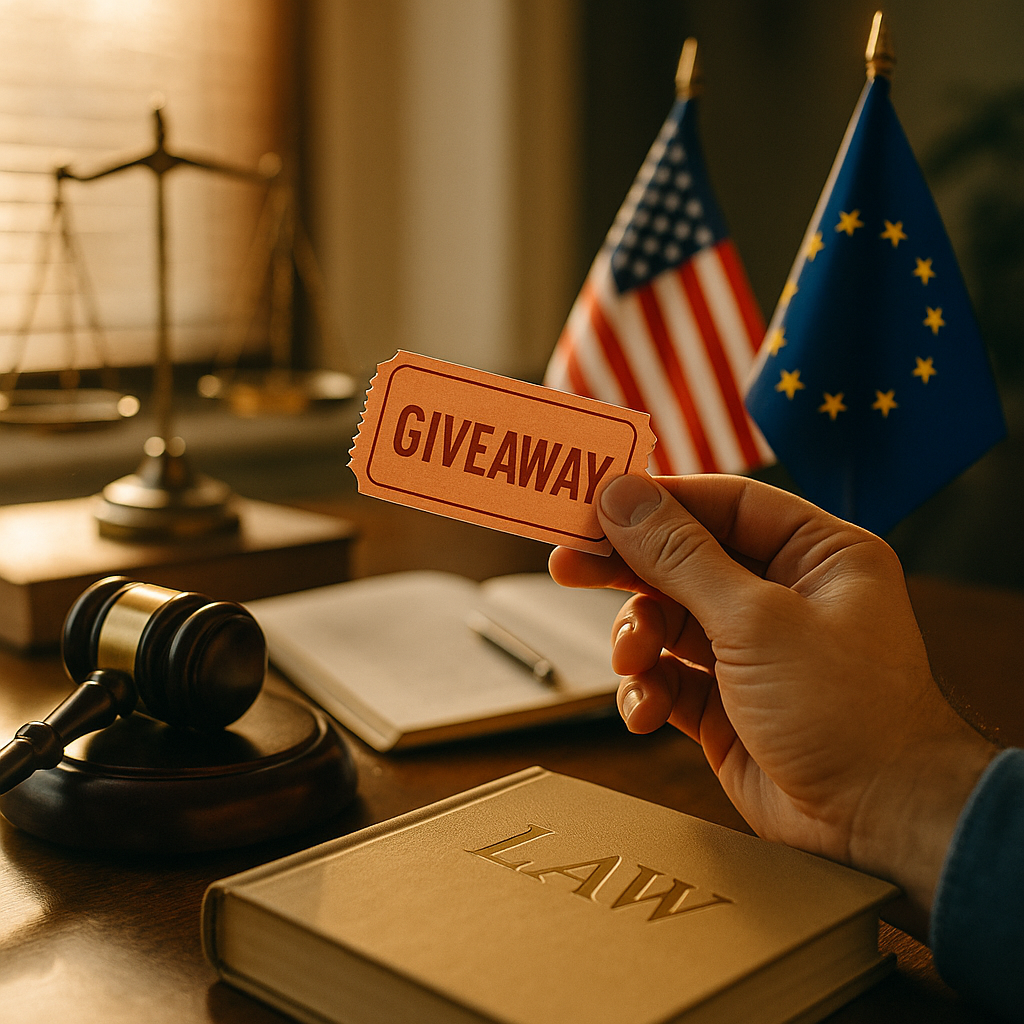Understanding sweepstakes and giveaway laws in North America and the EU is essential for any business or individual planning a promotional contest. A misstep can lead to fines or even criminal liability. In this comprehensive guide, we’ll help you confidently navigate the ever-changing legal landscape, staying compliant while maximizing the impact of your campaign.
Sweepstakes and Giveaway Laws: Key Differences Across Regions
Despite their popularity, sweepstakes and giveaways are subject to a complex web of regulations that differ significantly between North America and the European Union. In the United States and Canada, federal and state/provincial statutes distinguish between games of chance and games of skill. The EU employs harmonized consumer protection rules but also relies on individual member state legislation.
Key differences stem from:
- Definitions of “chance” versus “skill”
- Consideration (asking for purchase or effort in exchange for entry)
- Consumer privacy and data use
- Disclosure requirements and transparency
Understanding where your audience lives directly impacts the legal requirements your promotion must meet.
Eligibility Requirements for Sweepstakes and Giveaways
One of the most overlooked sweepstakes law issues is setting clear eligibility rules. In North America, entrants are often required to be of legal age, typically 18 in the U.S. and Canada. Some jurisdictions restrict or prohibit certain types of entrants, including:
- Employees of the organizing company
- Family members or household inhabitants of employees
- Certain classes, such as minors or residents of excluded regions (e.g., Quebec, Puerto Rico)
Within the European Union, similar age restrictions apply but must adhere to GDPR, which may set the age of online consent as high as 16 in some member states. Companies should clearly communicate who is eligible to enter and which regions or countries are excluded, particularly when running a multi-country campaign.
Rules, Disclosures, and No Purchase Necessary Clauses
Transparency is essential in giveaway legal compliance and is strictly enforced by regulators. Laws require organizers to provide official rules that detail the contest mechanics, odds of winning, prize descriptions, start/end dates, and sponsor information. In the U.S. and Canada, the “No Purchase Necessary” rule is fundamental to ensuring a sweepstakes does not qualify as an illegal lottery. Organizers must also offer an alternative, free entry method.
In the EU, regulatory focus falls on clarity, fairness, and data protection. Failure to disclose material information—such as the nature or value of the prize—may be considered misleading under the Unfair Commercial Practices Directive 2005/29/EC. Publicly displaying official rules builds trust while fulfilling legal obligations.
Data Privacy, GDPR, and CAN-SPAM: Protecting Entrant Information
Modern sweepstakes and giveaways collect vast amounts of participant data. Both GDPR in the EU and CAN-SPAM in the U.S. impose decision-altering requirements. In the EU, you must have a lawful basis such as legitimate interest or consent to process personal data—such as email addresses for a newsletter opt-in. Complying with data minimization and transparency is mandatory.
For North American organizers, compliance extends to:
- Obtaining consent before sending promotional communications
- Allowing easy opt-outs from marketing emails (CAN-SPAM Act, Canada’s CASL)
- Publishing clear privacy policies explaining data use, storage, and transfer
Multi-national promotions often require dual compliance, so always seek local legal advice if you expect EU participants.
Taxation and Prize Delivery Obligations
Winners—and organizers—face distinct tax responsibilities depending on the prize and location. In the U.S., the Internal Revenue Service (IRS) treats prizes over $600 as taxable income, requiring the organizer to issue a 1099 form and report the prize to tax authorities. Canadian winners generally avoid taxes on sweepstakes prizes, but rules differ for skill-based contests.
In the EU, some member countries tax contest prizes, while others do not. Organizers must check local tax codes or risk inadvertently creating financial liabilities for themselves or their winners. Regardless of geography, it is crucial to:
- Describe how prizes will be delivered
- Disclose who bears tax responsibility—organizer or winner
- Inform winners about reporting obligations
Best Practices to Avoid Legal Pitfalls
Legal compliance is only the baseline for a successful contest. To maximize trust and minimize complaints, consider these best practices based on 2025 industry standards:
- Consult with legal counsel in every jurisdiction where residents can enter.
- Write official rules and privacy notices in clear, plain language.
- Use automated random drawing tools or adjudicators for fairness and auditing.
- Keep detailed records of entries, winner selection, and prize delivery.
- Respond promptly to entrant questions or complaints to demonstrate accountability.
Staying informed on evolving regulations helps you adapt, protect your brand reputation, and ensure participant trust—key ingredients for a successful campaign.
FAQs About Sweepstakes and Giveaway Laws in North America and the EU
-
Are sweepstakes legal in every U.S. state and Canadian province?
Sweepstakes are permitted in most jurisdictions, but exceptions exist (such as Quebec or Rhode Island for higher-value contests). Review local laws for exclusions.
-
Can I require a purchase to enter my giveaway?
Generally, no. “No Purchase Necessary” is critical to avoid being classified as a lottery, which is regulated heavily. An alternate free method of entry must always be provided.
-
What information must I include in official rules?
Include eligibility criteria, entry methods, odds of winning, full prize descriptions, start/end dates, sponsor details, and any important disclosures.
-
What are the main GDPR concerns for EU sweepstakes?
Collect only necessary participant data, inform entrants how their data will be used, and never add users to marketing lists without clear consent. Allow participants to exercise data rights.
-
Who pays taxes on giveaway prizes?
This depends on local law—usually the winner in the United States, but sometimes the organizer in the EU. Always research the country or region rules before publishing your contest.
In conclusion, understanding sweepstakes and giveaway laws in North America and the EU will protect your campaign from legal setbacks while fostering participant trust. Study the rules, seek local expertise, and prioritize transparency to run effective, compliant, and engaging promotions in 2025 and beyond.
